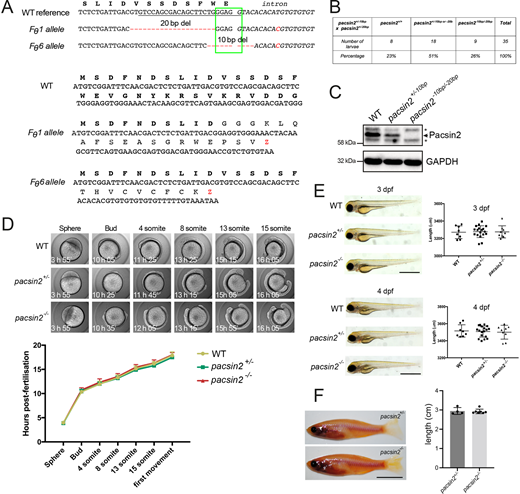Fig. 2
Generation and normal development of pacsin2 knockout zebrafish. (A) Top, mutant pacsin2 alleles in F0 founder zebrafish (Fθ) aligned to a wild-type reference sequence. Red dashes indicate deleted nucleotides. Red nucleotides indicate an SNP present in the intronic sequence. The green box indicates a splice donor site at the end of exon 2. The underlined sequence is the guide RNA target sequence. Bottom, predicted protein sequences encoded by the two indicated pacsin2 mutant alleles. (B) Larvae produced by crossing pacsin2+/−10bp and pacsin2+/−20bp zebrafish are at the expected Mendelian ratio. (C) Western blot analysis of whole-brain protein lysates from wild-type, pacsin2+/−10bp and pacsin2−10bp/−20bp adult fish blotted for Pacsin2 (arrow indicates Pacsin2 band, asterisks indicate cross-reacting proteins) and GAPDH. (D) Wild-type, pacsin2+/− and pacsin2−/− embryos were imaged every 10 min over the first 20 h post-fertilisation and developmental progression scored. Data were analysed using two-way ANOVA and Dunnett's multiple comparison test. In all cases P>0.05, n=7-10 embryos per genotype. Error bars=s.d. (E) Zebrafish larvae at 3 and 4-dpf were imaged on a brightfield dissecting microscope and assessed for gross morphology (left). Body length was also measured (right). Data were analysed by one-way ANOVA followed by a post-hoc Tukey's multiple comparison test. In all cases P>0.05. n=8-18 larvae per genotype. Error bars=s.d.; scale bar: 1 mm. (F) Left, 5-month-old adult male pacsin2+/− and pacsin2−/− clutch-mates were photographed and inspected for gross morphology (left). Right, body axis length was measured and analysed using an unpaired t-test, P>0.05. n=4 (pacsin2+/−) and 7 (pacsin2−/−). Error bars=s.d.; scale bar: 1 cm.

